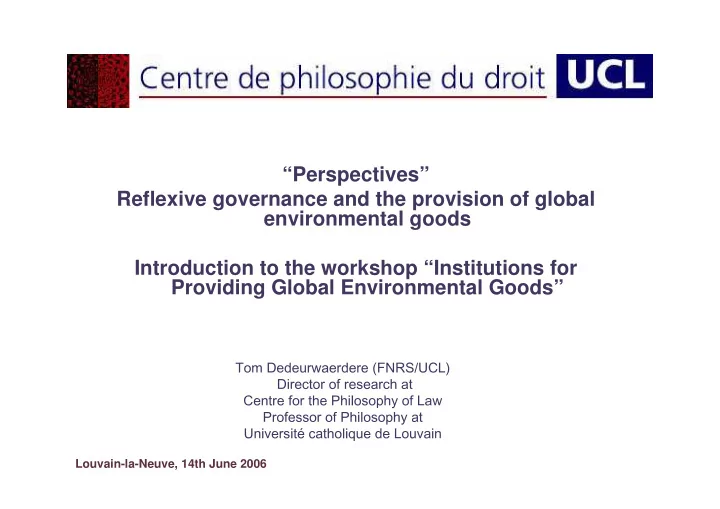

“Perspectives” Reflexive governance and the provision of global environmental goods Introduction to the workshop “Institutions for Providing Global Environmental Goods” Louvain-la-Neuve, 14th June 2006
Reflexive Governance and the Provision of Global Environmental Goods 1. Conference focus Dealing with strong uncertainty and heterogeneous collective preferences in the provision of Global Environmental Goods
The way the problem is addressed Traditional way of dealing with Global Public Goods (GPG) provision: Information management – Focus on Information management (extraction, aggregation, information costs) Contribution of the workshop : design of institutions for the building of collective preferences and to generate new knowledge on the solutions – About Preferences: Individual and Collective Preferences in matter of GPG have to be built. – About Solutions: Knowledge on the relevant way to provide GPG has to be generated
• Workshop examples of institutional design under uncertainty on solutions : – Post-Normal Science (Silvio Funtowicz) – New property rights on biodiversity in the Convention on Biological Diversity : successful change in residual claimant, unanticipated effects on the level of residual controller (Timo Goeschl) – Etc. • Workshop examples of institutional design under heterogeneous collective preferences : – Difference between National and Regional Climate Change policy in the state of Sao Paulo -Brazil (Kamyla Cunha) – Difficulty of establishing an environmental “convention” (Valerie Boisvert) – Etc.
2. Building and implementing institutions Three models of institutional design in the Social Sciences 2.1. Realism : Bargaining e.g. environmental mediation 2.2. Institutionalism : coordination devices (each individual gains from setting up common coordination devices) e.g. Property rights on traditional knowledge (Tim Swanson and Mare Sarr) e.g. Community based institutions to control illegal traffic in wildlife species (Sarah Hernandez) etc. 2.3 Reflexive governance : cognitive procedures organizing a feedback on the multiple regulatory frameworks and the governance regimes : change in norms and beliefs Two main types � through actors self-regulation � through institutional learning
Reflexive Governance and the Provision of Global Environmental Goods 2.3.1. Reflexive governance through self-regulation Actors self-adjust their action strategies e.g. actors network theory (Per Stromberg) e.g. quality label in Dutch Horticulture (Nicolien van der Grijp) Etc. Proposed ameliorations : institutional framing International authority for regulation Alternative dispute resolution
Reflexive Governance and the Provision of Global Environmental Goods 2.3.2. Reflexive governance through institutional learning Institutions organize learning processes to change norms and beliefs e.g. IPCC (cf. Bernd Siebenhüner) e.g. Multicriteria Assessment of national energy policy (Sigrid Stagl) Etc. Proposed ameliorations : Interactive process taking into account collective preferences and contextual scenarios Harvard environmental negotiation project
Reflexive Governance and the Provision of Global Environmental Goods 2.3.3. Dimensions of reflexive governance for implementing new normative principles a. Adjustment of the actors and institutions to emerging contexts : self-regulation and institutional learning b. Cognitive disposition ; openness towards new social possibilities (ex. Allan Buchanan, role of “provisional legitimacy : case of “precautionary principle”?) c. Reflexive learning as an institution
Reflexive Governance and the Provision of Global Environmental Goods 3. Perspectives Combining institutional design and reflexive governance Component A: design of institutions for overcoming collective action problems in the provision of global environmental goods Component B: institutional rules for enabling reflexivity on the process of building and implementing institutions
Recommend
More recommend